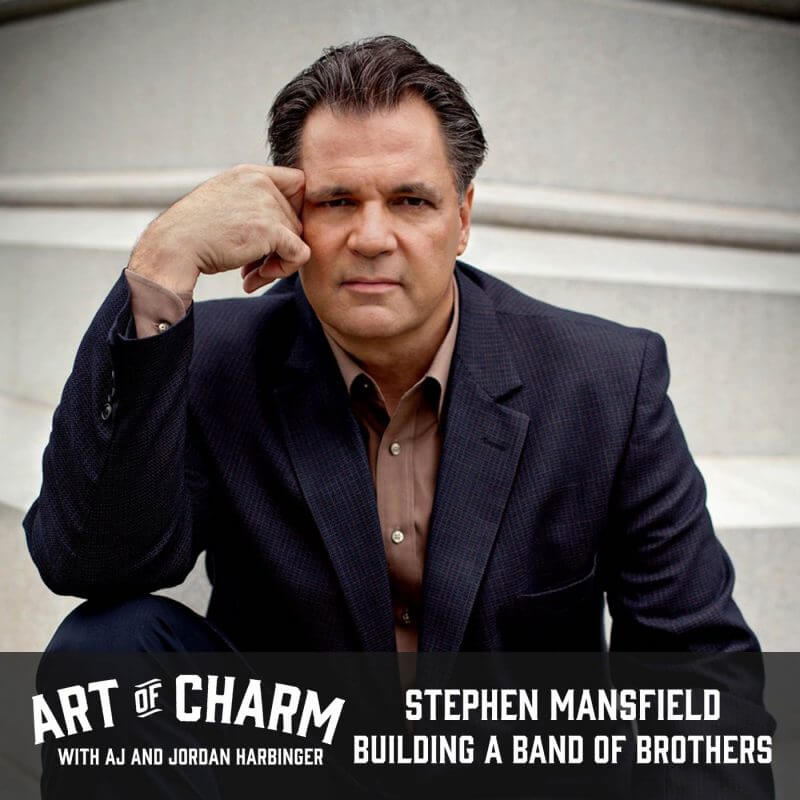Stephen Mansfield (@MansfieldWrites) strives to inspire men to form a Band of Brothers around themselves to help them perfect noble manhood in their lives.
The Cheat Sheet:
- Learn why most men in contemporary society don’t have a best friend.
- Why does Stephen believe that men need an older brother figure?
- What is a Free Fire Zone?
- Discover why assembling a Band of Brothers keeps a man on course to become great.
- Learn how to build this Band of Brothers.
- And so much more…
[aoc-subscribe]
In this episode of The Art of Charm, we talk to New York Times bestselling author Stephen Mansfield, whose love for history and applied research has led him to write about the faith of famous people, what it takes to be a truly manly man, how many sips it takes to get to the center of the story of (arguably) the best beer in the world, and the Kurdish Miracle that may give ISIS more trouble than it bargained for in the Middle East.
Stephen speaks widely about men, leadership, faith, the lessons of history, and the forces that shape modern culture. Here, we discuss how men who seek to become truly great benefit from assembling a Band of Brothers around themselves — what it means, what advantages it offers, and how to do it.
More About This Show
If your teenager needs to make bail for smashing pumpkins on Halloween but you’re out of town, who can you call to help make sure they don’t have to spend the night in county jail? Similarly, if you’re out of town and your wife needs help, is there a close friend who can make sure she’s okay?
According to prolific bestselling author and leadership coach Stephen Mansfield, it’s become increasingly rare for men to have best friends. “The stats are really startling,” says Stephen. “The average guy in America over 25 cannot name a best friend.” It’s hardly surprising when we stop to consider the willful isolation from one another our society seems to encourage; when was the last time you had a conversation with your neighbor? Have you ever met your neighbor? Try not to feel too bad. These days, it’s not uncommon for people to share walls for years yet never share an introduction.
And while it might seem that such an environment would breed more self-reliance, it actually magnifies the loneliness that a lot of people feel — particularly post-college men who no longer have a social mechanism in place to share a bond with other men. While they may be able to name a best friend they had in school or throughout childhood, chances are pretty good they’ve gone their separate ways by adulthood. And where there’s loneliness, there’s depression.
“In England,” says Stephen, “the main cause of [unnatural] death among men over 50 years of age is suicide. And the main reason that they give in suicide notes and other kinds of analyses is loneliness.”
And while that’s the only western country where this is true at the moment, Stephen sees the pattern gaining traction in the United States.
“Most men are very wistful and kind of sentimental when they go down memory lane and they remember the buddies they had in high school, college, maybe their early professional days when they were single,” says Stephen. “But job, career, marriage, family sort of moved them away from those relationships — or just natural moving around like we all do — and then…what happens is that phone call to a best friend happens once a year, but you are floating around in a sea of casual relationships and you don’t really have any male in your life that you can count on.”
Men often rely on their wives or significant others to fill this role, but Stephen says it’s not functionally the same as having a best male friend or, ideally, a circle of friends — a Band of Brothers — to watch out for one another. And rather than having the effect of bringing a married or serious couple together, it adds a strain to the relationship that creates disfunction.
“It’s a bad progression and it just happens naturally,” says Stephen. “That’s why we’ve got to be a bit more intentional about building this Band of Brothers.”
Obviously, women aren’t immune to the pressures of loneliness, but studies seem to confirm that, as a group, they tend to be more socially adaptable than men — and this begins early on.
Stephen recounts psychological tests where a group of girls and a group of boys are each placed in their own rooms, and each child has a chair. The girls tend to move their chairs into a circle so they’re facing each other, and one girl will pretty quickly break the silence to remark about something personal — maybe that they like someone else’s hair — and the circle easily becomes very social.
In the case of the boys, they’ll typically place their chairs side-to-side and sit in silence. Eventually, one might say something like, “Hey, I’ll bet we can climb that tree,” or, “I’ll bet we can set that thing over there on fire,” or, “I’ll bet we can beat the girls at vollyball.”
“Men need to feel themselves part of a team,” says Stephen. “They need the Older Brother Syndrome. They need the older brother input, and they also need people with whom they have what I call a Free Fire Zone. Men respond better than women, and this is certainly no comment here on women’s athletic ability, but men rely on, I should say, more desperately — maybe that’s the way to say it — the coaching. The input from the older brother. The guy who’s holding up a mirror. The guy who’s telling him the truth about himself that nobody else will.”
“Women are more easily combined. They more easily bond. They more easily invest in each other. Men need to have some kind of a common cause, some kind of a common thing they’re doing…build a house, climb a mountain, be on a team, do something together. And out of that comes the kind of relationships that help them become better men as those relationships get more genuine and more hard-hitting — and more fun!”
Again, as men grow away from boyhood and pick up the skills that move them out of their parents’ house and the responsibilities that keep them out, the natural bonds that happen easily on the playground among males no longer have a forum to forge them. This is why Stephen says it’s important for men to be conscious of this tendency in adulthood and make a concerted effort to maintain these bonds or find ways to forge new ones.
You can be happily married with a ton of kids and feel fulfilled in many different ways, but Stephen feels that there’s still no substitute for the balance to life that a close-knit Band of Brothers provides.
“If all a man has is his alone time,” says Stephen, “his wife and his children, then he’s not going to be rounded. He’s not going to have people who can warn him about things. He’s not going to have people who challenge him to be a better man, and I don’t think he’s going to be what somebody calls a 360 Man — a fully orbed man. A fully developed man.”
Consider the all-too-common example of a man who, as he grows older, lets his fitness deteriorate, becomes set in his ways, and comfortable — perhaps a little too comfortable — with the status quo. “He can become one-dimensional when it comes to being a lover and a husband of his wife,” says Stephen, “he can [lack in] being the father he ought to be, he can start to develop horrible habits of every kind that are really destructive to him, and he’s not pursued.”
But when men get together in groups — Stephen gives the example of shooting some hoops with the guys — their whole approach to interaction changes.
“They don’t ask each other permission or get some kind of a written contract. They start yelling at each other to make each other better!” Stephen says. “All that kind of coaching language that we do with each other, it makes us better. It makes us team up. It challenges us to up our game. And we need that in life as well as in sports, and most of us move away from it. Which is why the average American male remembers high school and college as his best time of improvement and walking with a Band of Brothers.”
“There’s no reason for that to go away. In fact, we need that more as we go along in life.”
So, if we find we’re at the point in life where this type of interaction is so crucial to our well-being but we just don’t have the social opportunities (and, to be fair, skills) we had when we were younger, how does one start to assemble a Band of Brothers?
First, it’s important to differentiate between a group of casual friends and a Band of Brothers.
“The whole idea,” says Stephen, “the thing that distinguishes a group of friends from a Band of Brothers is you’ve taken the nature of the relationship and your openness to input to another level.”
To a Band of Brothers, for example, it’s perfectly acceptable for you to confide that you think you suck at being a father to a girl, or that you’re 50 pounds heavier than you’d like to be. And then you ask for feedback. That Band of Brothers helps you in ways that your wife or significant other may be ill-equipped to handle. Stephen calls this open exchange of honest conversation a Free Fire Zone.
“I turned to my guys and I said, ‘Look. Anything you need to say to make me a better man, say it. Anything you need to say to make me more successful and be better in all the roles that I play, say it. And I want you to be open to the same thing.’ That came about with a gentle turning of a group of friends into a bunch of guys who are partners with me in becoming the best men we could be.”
So in Stephen’s case, it was by taking a group of existing relationships — and consciously making an effort to turn it into something with the potential for so much more — that his Band of Brothers came about.
Listen to this episode of The Art of Charm in its entirety to pick up more tips for creating your own Band of Brothers, how Stephen began the vetting process for his over a cheeseburger with a friend, how you can tell if someone’s not ready for inclusion in your Band, how you can enlist the best candidates to cooperatively engage in what Stephen calls “the project of noble manhood,” and lots more.
THANKS, STEPHEN MANSFIELD!
Resources from this episode:
StephenMansfield.TV
GreatMan.US
Books by Stephen Mansfield
The Art of Charm bootcamps
You’ll also like:
-The Art of Charm Toolbox
-Best of The Art of Charm Podcast
On your phone? Click here to write us a well-deserved iTunes review and help us outrank the riffraff!




